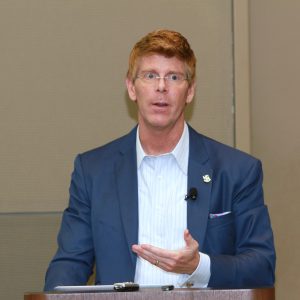
How should we respond virtuously to the issue of climate change? During his lecture at Acton University on June 23, Jay Richards wrestled with this question before a nearly packed room. Richards is an author, assistant research professor in the School of Business and Economics at The Catholic University of America, a senior fellow at the Discovery Institute and executive editor of The Stream. During his talk, Richards outlined four questions that he thinks are valuable when approaching the topic of climate change:
1. Is the Earth warming?
2. Are humans causing (or contributing to) it?
3. Is it bad?
4. Would the advised policies, currently the Paris Climate Deal, make any difference?
Richards went to some depth explaining how the CO2 contributions to global temperature are logarithmic in nature; the more CO2 is added the less of an effect it directly has on temperature. Many climate scientist, therefore, are concerned with feedback loops, not the effects of CO2 itself. Feedback loops can be either positive or negative. A positive feedback loop is when the initial circumstance, in this case high levels of CO2 and higher temperatures, results in a process that multiplies the result, like if the higher temperature caused other processes which increased the temperature further. A negative feedback loop is one in which the initial circumstance results in a process which reverses the initial condition. The models scientist use predict more positive feedback loops, meaning that their models predict the increased temperature resulting in further increases in temperature. However, the feedback loops are not well understood, nor have scientists identified all of the loops that exist. All of the models developed and used by scientists indicate that temperatures should be higher than they have been for the recorded last ten years. Recently temperatures have been within what would be considered a normal range. The only exceptions are El Niño years, during which temperatures are higher than average, which Richard argues are considered a common phenomenon that has occurred for thousands of years. Richards suggests that the feedback loop from the increased temperature, due to CO2, is more likely to be neutral, with equal negative and positive feedback loops counteracting one another. Richards states that while the evidence seems to point towards a neutral feedback loop there is insufficient evidence to prove this.
Borrowing from his book The Privileged Planet, which he co-authored with astronomer Guillermo Gonzalez, Richards reached two main conclusions. The first: “Even if it is a catastrophe we still ought to focus on development,” Richard notes. “Particularly in poor communities.” Poor people will be the most strongly affected by the predicted results of climate change. They lack the material resources to respond and they lack the ability to escape the potentially negative effects of climate change by traveling. The second conclusion is that the real emphasis ought to be on adaptation. The evidence of consistent temperatures for the last ten years seem to suggest that the models proposed by the majority of climate scientists are based on incorrect assumptions. Nonetheless, Richards offers that by being prepared to adapt, the effects of climate change would be minimized. Focusing solely on limiting CO2 emissions for the sake of limiting CO2 emissions is not progress for Richards; he would rather see efforts to mitigate effects of potential warming. Being prepared to adapt includes continuing to progress technologically as well as fighting poverty, thus avoiding a situation where large numbers of the world’s poor are adversely effected by changing climate patterns.
There may still be insufficient evidence to prove, to the skeptic, that climate change is an impending crisis. However, by systematically evaluating the four questions provided by Richards and carefully analyzing which proposed solutions will actually do the most good in fighting the problems associated with climate change, we can hope to provide a bright future to our posterity.

